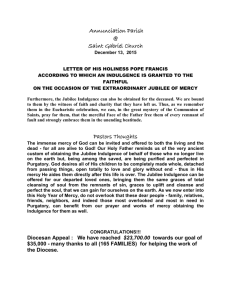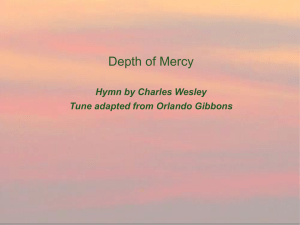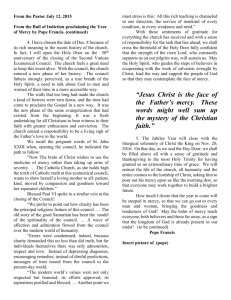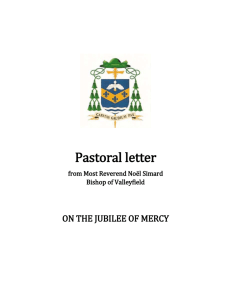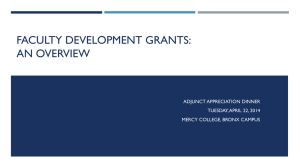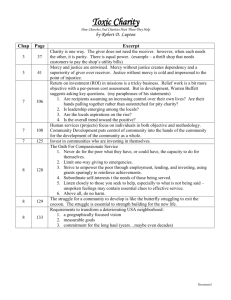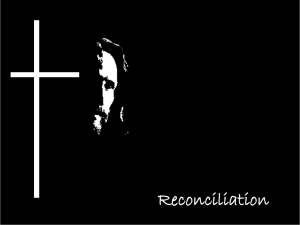Key Concepts for the Extraordinary Jubilee Year of Mercy
advertisement
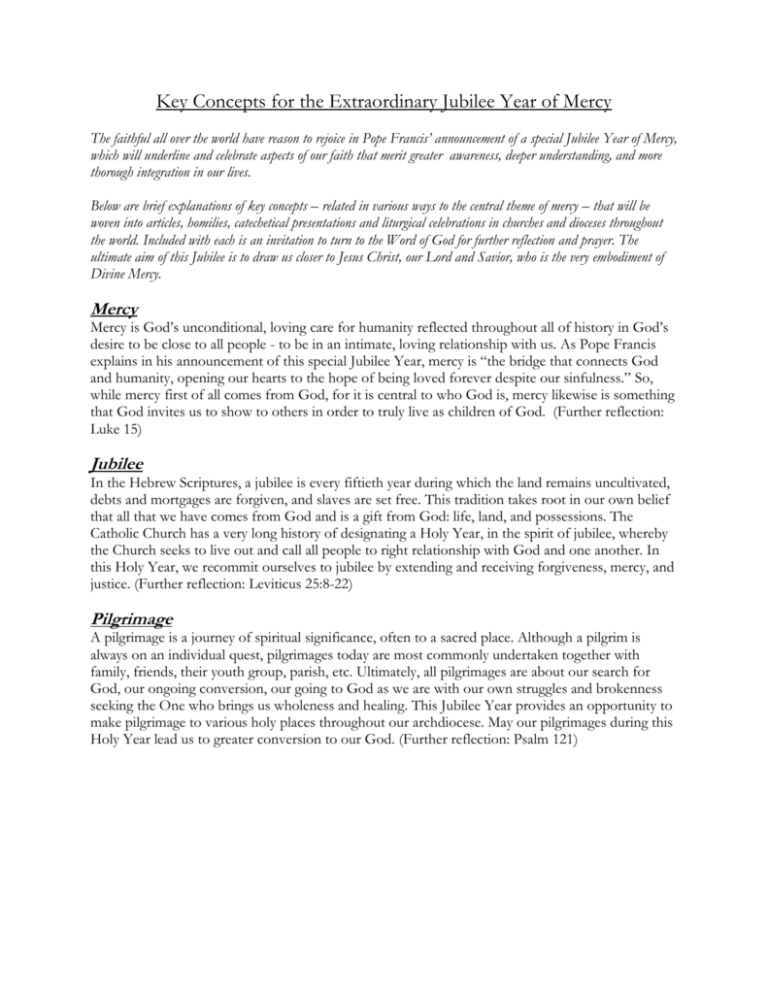
Key Concepts for the Extraordinary Jubilee Year of Mercy The faithful all over the world have reason to rejoice in Pope Francis’ announcement of a special Jubilee Year of Mercy, which will underline and celebrate aspects of our faith that merit greater awareness, deeper understanding, and more thorough integration in our lives. Below are brief explanations of key concepts – related in various ways to the central theme of mercy – that will be woven into articles, homilies, catechetical presentations and liturgical celebrations in churches and dioceses throughout the world. Included with each is an invitation to turn to the Word of God for further reflection and prayer. The ultimate aim of this Jubilee is to draw us closer to Jesus Christ, our Lord and Savior, who is the very embodiment of Divine Mercy. Mercy Mercy is God’s unconditional, loving care for humanity reflected throughout all of history in God’s desire to be close to all people - to be in an intimate, loving relationship with us. As Pope Francis explains in his announcement of this special Jubilee Year, mercy is “the bridge that connects God and humanity, opening our hearts to the hope of being loved forever despite our sinfulness.” So, while mercy first of all comes from God, for it is central to who God is, mercy likewise is something that God invites us to show to others in order to truly live as children of God. (Further reflection: Luke 15) Jubilee In the Hebrew Scriptures, a jubilee is every fiftieth year during which the land remains uncultivated, debts and mortgages are forgiven, and slaves are set free. This tradition takes root in our own belief that all that we have comes from God and is a gift from God: life, land, and possessions. The Catholic Church has a very long history of designating a Holy Year, in the spirit of jubilee, whereby the Church seeks to live out and call all people to right relationship with God and one another. In this Holy Year, we recommit ourselves to jubilee by extending and receiving forgiveness, mercy, and justice. (Further reflection: Leviticus 25:8-22) Pilgrimage A pilgrimage is a journey of spiritual significance, often to a sacred place. Although a pilgrim is always on an individual quest, pilgrimages today are most commonly undertaken together with family, friends, their youth group, parish, etc. Ultimately, all pilgrimages are about our search for God, our ongoing conversion, our going to God as we are with our own struggles and brokenness seeking the One who brings us wholeness and healing. This Jubilee Year provides an opportunity to make pilgrimage to various holy places throughout our archdiocese. May our pilgrimages during this Holy Year lead us to greater conversion to our God. (Further reflection: Psalm 121) Holy Year Door On December 8th, Pope Francis will continue a long tradition of opening the Holy Year Door at St. Peter’s Basilica. While simply a door, it is one filled with rich symbolism and importance in our celebration of Holy Years. In the Gospels, Jesus reminds us that he is the door through which we enter into the pasture of the Good Shepherd; passing from a life filled with hatred, injustice, and judgement into one filled with the embracing love, compassion, and mercy of God. In order to reach the Holy Year Door, whether in Rome or in our own cathedral in New Orleans, we must make a pilgrimage and embrace the call to conversion. Let us pray that we may cross the threshold into a life of mercy towards all, just as God has been merciful with us. (Further reflection: John 10:9 and Psalm 23) Conversion Literally a “turning around,” conversion involves a profound change of mind, heart, and action away from sinful attitudes and behaviors toward God and the good of others. Conversion occurs as a result of one’s response to the invitation and assistance (grace) of God. While one may experience a distinct moment of conversion in life, we must recognize that conversion is a daily, lifelong journey. This Jubilee Year of Mercy presents us with a graced opportunity to listen for God’s invitations to change our lives. (Further reflection: Luke 19) Forgiveness There are two distinct but related aspects of forgiveness. The first is letting go of anger or resentment toward those who have committed an offense. The second aspect of forgiveness is releasing them from the obligation of repayment. The Lord’s Prayer radically connects our own plea for the Father’s forgiveness with our willingness to forgive others. If we cling to our anger and resentment toward those who have wronged us, we will be cut off from the Father’s forgiveness – not because God ceases to offer it, but because our hardened hearts cannot receive it. “[T]his outpouring of mercy cannot penetrate our hearts as long as we have not forgiven those who trespass against us.” (CCC, #2840) (Further reflection: Matthew 18:21-35) Compassion Compassion means, literally, “to feel with.” (CCC #1503 ff.) Thus, “At the sight of the crowds, [Jesus’] heart was moved with pity for them because they were troubled and abandoned, like sheep without a shepherd.” He was able to feel their sense of abandonment and their lack of direction. Similarly, in the parable of The Prodigal Son, when the remorseful, wayward son “was still a long way off, his father caught sight of him, and was filled with compassion.” He knew the sense of humiliation, worthlessness and near-despair that his son was feeling, because he could feel it, too. Therefore, he greeted him with a kiss, rather than a scolding. Such is the fruit of genuine compassion, which lies at the heart of mercy. (Further reflection: Matthew 9:36; Luke 15:11-32) Grace Grace is a participation in the life of God. It is not some abstract concept, but rather the real and living presence of God, who freely and undeservedly assists us and aids us in responding to his loving invitation to become his adoptive children and to share in his own divine life. (CCC #1996) (Further reflection: John 1:12-18 and 2 Peter 1:3-4) (Divine) Providence Divine Providence is God’s way of guiding and caring for all of creation, leading us towards an everlasting union with him. God always was, always is, and always will be providing for us and assisting (gracing) us; however, we still have to make the everyday decision to live as disciples of Jesus. We respond to God’s providential assistance through our prayers and actions, especially in how we live out the Corporal and Spiritual Works of Mercy. (Further reflection: Jeremiah 29:11) Justice When we attend to the needs of those in want, we give them what is theirs, not ours. Justice is the constant and firm will to give God and neighbor what is due to them. We act justly when we recognize the dignity of each human person and cooperate with God’s grace. In his love and mercy, God does not give us what we deserve in terms of human justice; rather, he showers freely given grace, mercy, and forgiveness upon us. (Further reflection: Luke 7:36ff. and Matthew 20) Hesed Hesed is a Hebrew word which means God’s loving kindness, and describes God’s mercy, forgiveness, and tenderness. In Catholic Theology, this concept is associated with the word mercy, yet it means so much more. It involves the very heart of a people. Looking through the lens of the Hebrew Scriptures, we can develop this same posture of love, mercy, and forgiveness in its divine meaning and essence. (Further reflection: Hosea 2:21) Archdiocese of New Orleans Office of Evangelization 1000 Howard Ave, Suite 913 New Orleans, LA 70113 504-267-9650 evangelization@arch-no.org nolacatholic.org

